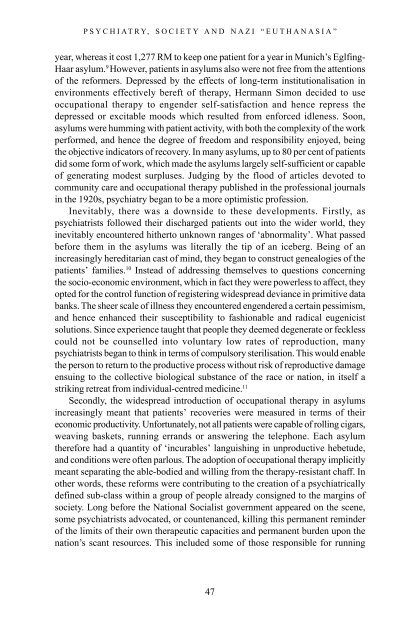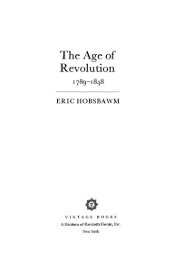The_Holokaust_-_origins,_implementation,_aftermath
The_Holokaust_-_origins,_implementation,_aftermath
The_Holokaust_-_origins,_implementation,_aftermath
Create successful ePaper yourself
Turn your PDF publications into a flip-book with our unique Google optimized e-Paper software.
PSYCHIATRY, SOCIETY AND NAZI “EUTHANASIA”<br />
year, whereas it cost 1,277 RM to keep one patient for a year in Munich’s Eglfing-<br />
Haar asylum. 9 However, patients in asylums also were not free from the attentions<br />
of the reformers. Depressed by the effects of long-term institutionalisation in<br />
environments effectively bereft of therapy, Hermann Simon decided to use<br />
occupational therapy to engender self-satisfaction and hence repress the<br />
depressed or excitable moods which resulted from enforced idleness. Soon,<br />
asylums were humming with patient activity, with both the complexity of the work<br />
performed, and hence the degree of freedom and responsibility enjoyed, being<br />
the objective indicators of recovery. In many asylums, up to 80 per cent of patients<br />
did some form of work, which made the asylums largely self-sufficient or capable<br />
of generating modest surpluses. Judging by the flood of articles devoted to<br />
community care and occupational therapy published in the professional journals<br />
in the 1920s, psychiatry began to be a more optimistic profession.<br />
Inevitably, there was a downside to these developments. Firstly, as<br />
psychiatrists followed their discharged patients out into the wider world, they<br />
inevitably encountered hitherto unknown ranges of ‘abnormality’. What passed<br />
before them in the asylums was literally the tip of an iceberg. Being of an<br />
increasingly hereditarian cast of mind, they began to construct genealogies of the<br />
patients’ families. 10 Instead of addressing themselves to questions concerning<br />
the socio-economic environment, which in fact they were powerless to affect, they<br />
opted for the control function of registering widespread deviance in primitive data<br />
banks. <strong>The</strong> sheer scale of illness they encountered engendered a certain pessimism,<br />
and hence enhanced their susceptibility to fashionable and radical eugenicist<br />
solutions. Since experience taught that people they deemed degenerate or feckless<br />
could not be counselled into voluntary low rates of reproduction, many<br />
psychiatrists began to think in terms of compulsory sterilisation. This would enable<br />
the person to return to the productive process without risk of reproductive damage<br />
ensuing to the collective biological substance of the race or nation, in itself a<br />
striking retreat from individual-centred medicine. 11<br />
Secondly, the widespread introduction of occupational therapy in asylums<br />
increasingly meant that patients’ recoveries were measured in terms of their<br />
economic productivity. Unfortunately, not all patients were capable of rolling cigars,<br />
weaving baskets, running errands or answering the telephone. Each asylum<br />
therefore had a quantity of ‘incurables’ languishing in unproductive hebetude,<br />
and conditions were often parlous. <strong>The</strong> adoption of occupational therapy implicitly<br />
meant separating the able-bodied and willing from the therapy-resistant chaff. In<br />
other words, these reforms were contributing to the creation of a psychiatrically<br />
defined sub-class within a group of people already consigned to the margins of<br />
society. Long before the National Socialist government appeared on the scene,<br />
some psychiatrists advocated, or countenanced, killing this permanent reminder<br />
of the limits of their own therapeutic capacities and permanent burden upon the<br />
nation’s scant resources. This included some of those responsible for running<br />
47



